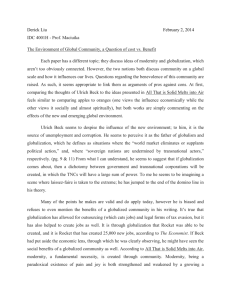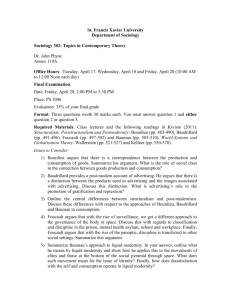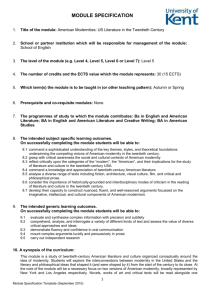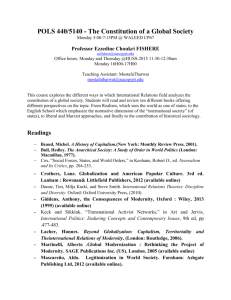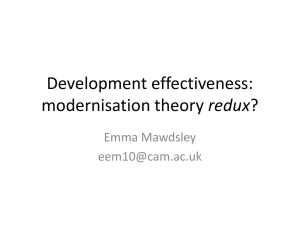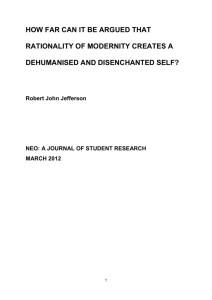Contemporary Theories of Modernity
advertisement
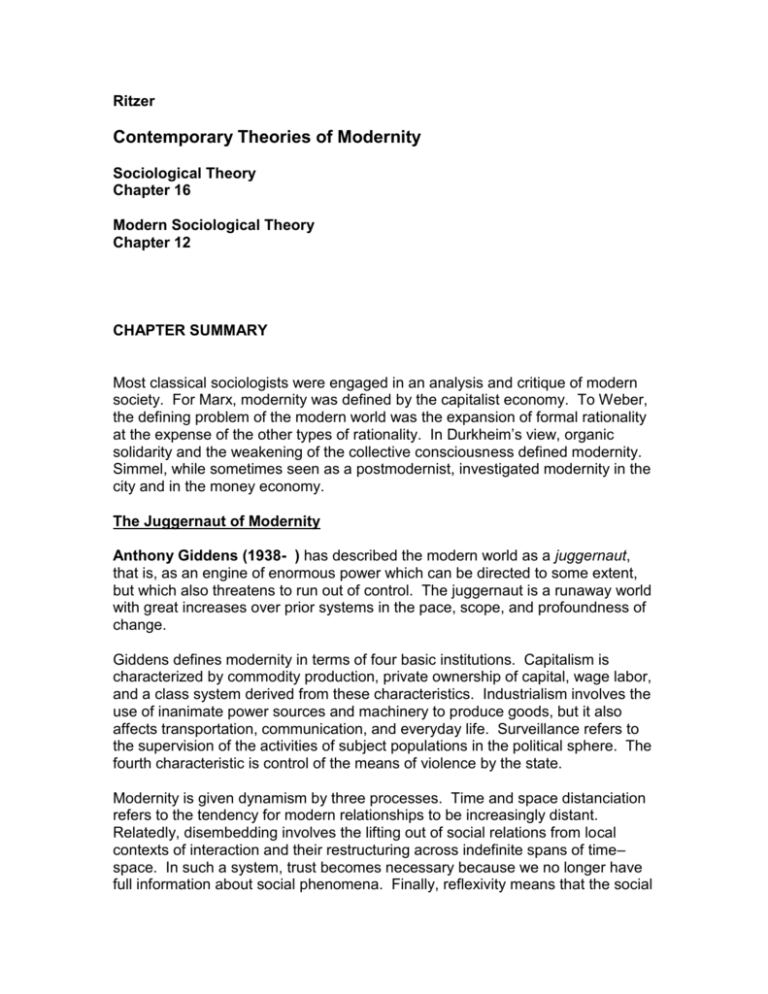
Ritzer Contemporary Theories of Modernity Sociological Theory Chapter 16 Modern Sociological Theory Chapter 12 CHAPTER SUMMARY Most classical sociologists were engaged in an analysis and critique of modern society. For Marx, modernity was defined by the capitalist economy. To Weber, the defining problem of the modern world was the expansion of formal rationality at the expense of the other types of rationality. In Durkheim’s view, organic solidarity and the weakening of the collective consciousness defined modernity. Simmel, while sometimes seen as a postmodernist, investigated modernity in the city and in the money economy. The Juggernaut of Modernity Anthony Giddens (1938- ) has described the modern world as a juggernaut, that is, as an engine of enormous power which can be directed to some extent, but which also threatens to run out of control. The juggernaut is a runaway world with great increases over prior systems in the pace, scope, and profoundness of change. Giddens defines modernity in terms of four basic institutions. Capitalism is characterized by commodity production, private ownership of capital, wage labor, and a class system derived from these characteristics. Industrialism involves the use of inanimate power sources and machinery to produce goods, but it also affects transportation, communication, and everyday life. Surveillance refers to the supervision of the activities of subject populations in the political sphere. The fourth characteristic is control of the means of violence by the state. Modernity is given dynamism by three processes. Time and space distanciation refers to the tendency for modern relationships to be increasingly distant. Relatedly, disembedding involves the lifting out of social relations from local contexts of interaction and their restructuring across indefinite spans of time– space. In such a system, trust becomes necessary because we no longer have full information about social phenomena. Finally, reflexivity means that the social practices of modern society are constantly reexamined and reformed in the light of incoming information. Giddens thinks that modernity has created a distinctive risk profile. Risk becomes global in intensity and in the expansion of contingent events that affect large numbers of people around the world. Our awareness of these risks gives us the sense of insecurity implied in the term juggernaut. Giddens argues that the reflexivity of modernity extends to the core of the self and becomes a reflexive project of identity formation. For example, the body is subject to a variety of regimes that help individuals mold their bodies. He also argues that intimate relationships have been set apart from the routines of ordinary life (sequestered). As a result, the reflexive effort to create a pure intimate relationship is usually separate from larger moral issues. The Risk Society According to Ulrich Beck (1944- ), we no longer live in an industrial society and are moving toward a risk society. Risk society is a form of reflexive modernity in which the central issue is how risks can be prevented, minimized, or channeled. These risks are being produced by the sources of wealth in modern society. Industry, for example, produces a wide range of hazardous consequences that reach across time and space. Beck also argues that science has become a protector of a global contamination of people and nature. He suggests that subgroups, such as large companies, are more likely than the governments to lead the way when coping with risks. McDonaldization and the New Means of Consumption There are four dimensions of formal rationality. Efficiency means the search for the best means to the end. Predictability means a world of no surprises. Rational systems tend to emphasize quantity, usually large quantities, rather than quality. Finally, formal rationality relies on non-human technology rather than human qualities. Formally rational systems have a variety of irrational consequences, such as dehumanization and demystification. Ritzer argues that the fast-food restaurant brings formal rationality to new heights. He argues that the prevalence of McDonaldization indicates that we still live in a modern world. Ritzer has also observed the rise of new means of consumption, such as shopping malls and superstores, since the end of World War II. He defines the means of consumption as entities that make it possible for people to acquire goods and services and for the same people to be controlled and exploited as consumers. The new means of consumption are modern because they are highly rationalized. Modernity and the Holocaust Zygmunt Bauman (1925-) considers the Holocaust to be the paradigm of modern bureaucratic rationality. The perpetrators of the Holocaust employed rationality as one of their major tools. Bauman suggests that the Holocaust was the product of modernity, not a result of a breakdown of modernity. Without modernity and rationality, the Holocaust would be unthinkable. Mass extermination required a highly rationalized and bureaucratized operation. Bauman suggests that bureaucracies, while not inherently cruel, are likely to be used for inhuman purposes. There is continuity between the rationality employed in the Holocaust and the rationalization of the fast-food industry today. Bauman believes that the conditions that created the Holocaust have not really changed and that only strong morality and pluralistic political forces can prevent a recurrence. Modernity’s Unfinished Project Jurgen Habermas (1929-) believes that social systems have grown increasingly complex, differentiated, integrated, and characterized by instrumental reason. At the same time the life-world has witnessed increasing differentiation and condensation, secularization, and the institutionalization of norms of reflexivity and criticism. A rational society would be one in which both the system and the life-world were permitted to rationalize following their own logics. However, in the modern world, the system has come to dominate the life-world. While we may be enjoying the fruits of system rationalization, we are deprived of the enrichment of life that comes from a life-world allowed to flourish. Habermas thinks that solutions to many of the problems in the modern world could be devised if the life-world had a better ability to steer the system. Habermas is critical of the postmodernists for rejecting modernity. Informationalism and the Network Society Manuel Castells (1942-) examines the emergence of a new society, culture, and economy in the light of the revolution in information technology. This revolution has led to a fundamental restructuring of the capitalist system. The spread of informational capitalism has led to the emergence of oppositional social movements based on self and identity. Accompanying the rise of the new global information economy is the emergence of a new organizational form called the network enterprise, which is characterized by flexible production, new management systems, organizations based on a horizontal rather than a vertical model, and the intertwining of large corporations in strategic alliances. As a result, the nature of work is being transformed. Castells asserts that the larger society is being reorganized into networks that are capable of unlimited expansion and able to innovate without disrupting the system. Castells suggests that individuals and collectivities whose identities are threatened by this new order actively oppose this new network society. Castells also believes that the rise of the network society means that the state is losing power vis-à-vis global capital markets. Globalization Globalization can be analyzed culturally, economically, politically, and institutionally. In each case, a key difference is whether one sees increasing homogeneity or heterogeneity on the world scene. At the extremes, the globalization of culture can be seen as the diffusion of common codes and practices or as a process in which cultural inputs interact to create hybrid blends. Theorists who focus on economic factors tend to emphasize the homogenizing effect of the expanding market economy. Some political/institutional thinkers focus on the worldwide spread of standard models of governance, while others suggest that local social structures make more of a difference in people’s lives than ever. Douglas Kellner (1943-) states that the key to understanding globalization is theorizing it as, at once, a product of technological revolution and the global restructuring of capital. While the capitalistic economy remains central to understanding globalization, technoscience provides its infrastructure. Giddens emphasizes the role of the West and the United States in globalization. He recognizes that globalization has both undermined local cultures and served to revive them. He also suggests that a clash is taking place today between fundamentalism and cosmopolitanism. Beck defines globalism as the view that the world is dominated by economics and that we are witnessing the emergence of the hegemony of the capitalist world market and the neo-liberal ideology that underpins it. Beck is critical of this conception as being oversimplified and linear. Beck sees greater merit in the idea of globality, in which closed spaces like nation-states are becoming increasingly illusory because of the growing influence of transnational actors. Beck refers to the rise of globality as a second modernity characterized by denationalization. Bauman sees mobility as the most powerful aspect of globalization. He argues that the winners in the “space war” are those who are able to move freely around the globe. The losers not only lack mobility but are also confined to territories denuded of meaning. Ritzer argues that there is an elective affinity between globalization and nothing. He defines “nothing” as centrally conceived and controlled forms devoid of most distinctive content. It is easier to export empty forms throughout the globe than it is to export forms that are loaded with content. We are witnessing the global proliferation of generic, dehumanized, and disenchanted forms. Arjun Appadurai discusses global flows and the disjunctures among them. He uses the suffix –scape to connote the idea that these processes have fluid, irregular, variable shapes. For example, ethnoscapes are mobile groups and individuals that play an important role in shifting the world. He also describes technoscapes, financescapes, mediascapes, and ideoscapes.

